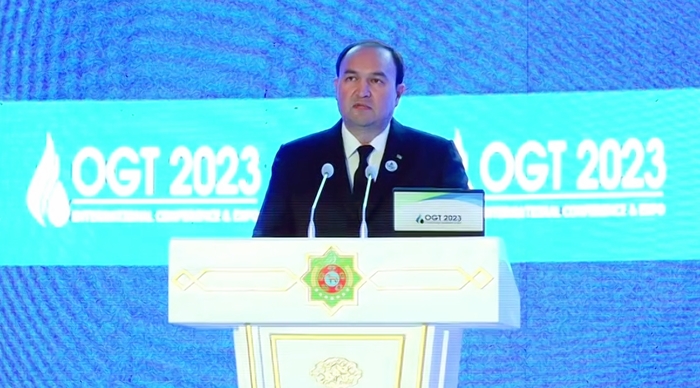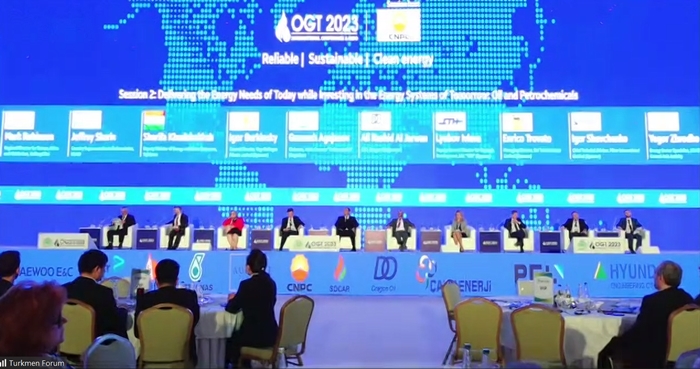The growth of energy consumption in developing countries, which began at the end of the last century and the continuing global demand for energy resources has led to an increase in global energy consumption. Today, the oil and gas industry provides 55% of the world’s energy, said Guvanch Agajanov, Chairman of the State Concern Turkmennebit (Turkmen Oil), who was a key speaker at the second session of the International Conference “Oil and Gas of Turkmenistan 2023” (OGT 2023) in Ashgabat on 26 October.
Turkmenistan’s view on the energy transition
Despite calls for a complete transition to alternative energy sources, Agadzhanov stressed that it is impossible to immediately and completely abandon oil and gas. Instead, the oil and gas industry should be part of the climate dialogue and climate solutions.
He also noted that the recent surge in hydrocarbon prices is due to a combination of factors, including the current market situation and other objective factors. However, he warned that a sharp reduction in investment in upstream projects could lead to a significant imbalance in supply and demand, and that existing oil and gas production may decrease by 75% by 2050 if underinvestment trends continue.
Agajanov emphasized that traditional energy sources, such as oil and gas, will continue to play a major role in meeting current energy needs. However, Turkmenistan is also taking an active position in the development of alternative energy sources, as evidenced by its initiatives aimed at forming new principles of global energy security, such as universal access to affordable energy sources and a balance between production goals and environmental protection objectives.
Resource potential of the Turkmen sector of the Caspian Sea
Agajanov also highlighted the resource potential of the Turkmen sector of the Caspian Sea, which is estimated at over 18 trillion tons of oil equivalent. He noted that the development of hydrocarbon resources in this area is a priority for Turkmenistan, and that the government welcomes foreign direct investment in this sector.
He added that the government is open to cooperation with international oil and gas companies on a parity basis and on terms of equality and mutual benefit.
Promising projects in the petrochemical industry of Turkmenistan
“Turkmennebit” has two affiliated refineries – the Turkmenbashi refinery complex and the Seydi refinery.
Refining of oil produced in Turkmenistan at these refineries allows to fully supply the domestic market with petroleum products, as well as export them to international markets – these are high-octane gasoline, aviation and technical kerosene, jet and diesel fuel, fuel oil, lubricating oils, polypropylene, heating oil, light gas oil, petroleum coke, liquefied gas, construction and road bitumen, and other petrochemical products, which form the basis of Turkmenistan’s export potential, stated Agajanov.
New technologies are being introduced at the refinery. Projects such as the construction of two gas turbines, the installation of delayed coking and tar de-asphalting are at the final stage.
Among the new projects planned for implementation at the Turkmenbashi refinery complex are: 1) construction of a convection-type reforming unit for hydrogen production using Haldor Topsoe technology; 2) overhaul with replacement of internal devices of a millisecond catalytic cracking reactor-generator unit.
At the Seydi refinery, it is planned to 1) build a new atmospheric oil distillation unit with an electric desalination unit with design capacity of 1 million tons per year and 2) build a nitrogen-oxygen unit using Air Liquid technology. In the future, the issue of exporting hydrogen and nitrogen is being considered.
Environmental priorities
As for the environmental aspect, Turkmennebit strives for the transition to the use of environmentally friendly and resource-saving technologies in its activities, the chairman of the concern stressed.
The entire volume of oil gas produced by the concern is used for the gas lift method of oil production, Agajanov stressed.
He also added that Turkmennebit is working with American companies on two projects aimed at reducing methane emissions and decarbonizing the Turkmen gas industry.
***
The second session of OGT2023 was devoted to the topic “Delivering the Energy Needs of Today while Investing in the Energy Systems of Tomorrow: Oil and Petrochemicals”. The session was moderated by Mark Robinson, Regional Director for Europe, Africa and the Middle East, GaffneyCline.
Session speakers:
- Keynote address: Guvanch Agajanov – Chairman, State Concern “Turkmennebit” – Delivering the Energy Needs of Today while Investing in the Energy Systems of Tomorrow: Oil and Petrochemicals
- Ali Rashid Al Jarwan – CEO, Dragon Oil – Sustainability & Growth in Turkmenistan
- Enrico Trovato – Managing Director, Eni Turkmenistan Limited
- Lyubov Ivleva – Deputy General Director for Strategic Development, LLC “STN”
- Igor Burkinsky – General Director, Yug-Neftegaz Private Limited
- Sharifa Khudobakhsh – Deputy Minister of Energy and Water Resources, Tajikistan
- Igor Shevchenko – Chief Technical Adviser, Mitro International Limited – Prospects for further development of the East Cheleken field
- Jeffrey Skarin – Country Representative to Turkmenistan, USAID
- Yegor Zbrodko – Energy Sector Specialist, USAID Power Central Asia Activity – Methane Emissions Abatement as a Tool to Increase Investment Attractiveness
///nCa, 26 October 2023
#OGT2023, #oil_and_gas, #Turkmenistan, #Turkmen_nebit

